Literacy: Personal Growth, Practical Application & Event Analysis
VerifiedAdded on 2023/03/31
|9
|2381
|321
Essay
AI Summary
This essay explores the multifaceted nature of literacy, extending beyond the basic ability to read and write to encompass critical thinking, effective communication, and the ability to influence others. The author reflects on their personal journey, highlighting the shift from struggling with writing to becoming a passionate blogger driven by a desire to comment on political and current affairs. The essay discusses the importance of analyzing information, understanding different perspectives, and expressing ideas persuasively. It also examines literacy events and the interplay between formal education and real-world experience, emphasizing the need for both structured learning and practical application to achieve true literacy and personal growth. The essay concludes that literacy is a continuous process of learning and development, essential for success in various aspects of life.
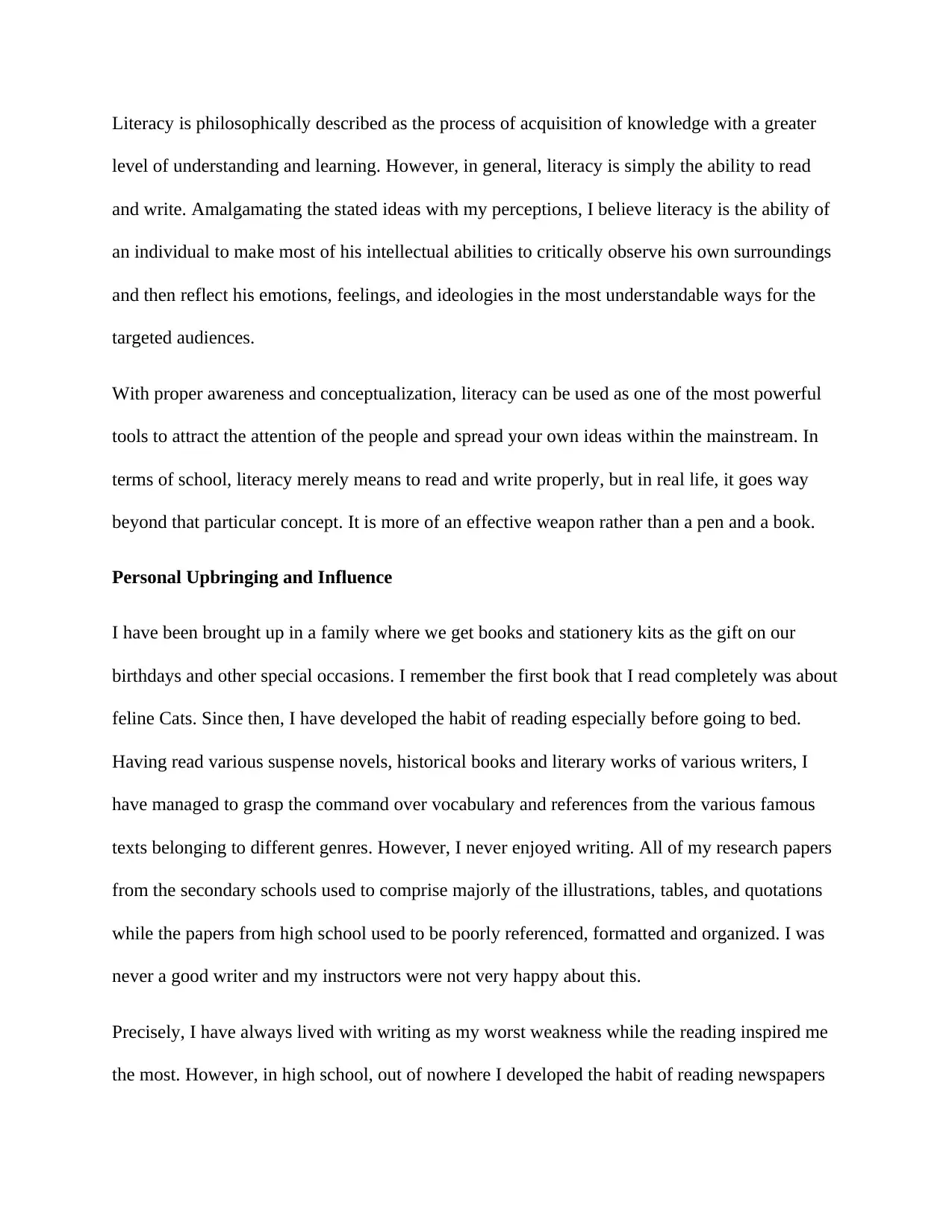
Literacy is philosophically described as the process of acquisition of knowledge with a greater
level of understanding and learning. However, in general, literacy is simply the ability to read
and write. Amalgamating the stated ideas with my perceptions, I believe literacy is the ability of
an individual to make most of his intellectual abilities to critically observe his own surroundings
and then reflect his emotions, feelings, and ideologies in the most understandable ways for the
targeted audiences.
With proper awareness and conceptualization, literacy can be used as one of the most powerful
tools to attract the attention of the people and spread your own ideas within the mainstream. In
terms of school, literacy merely means to read and write properly, but in real life, it goes way
beyond that particular concept. It is more of an effective weapon rather than a pen and a book.
Personal Upbringing and Influence
I have been brought up in a family where we get books and stationery kits as the gift on our
birthdays and other special occasions. I remember the first book that I read completely was about
feline Cats. Since then, I have developed the habit of reading especially before going to bed.
Having read various suspense novels, historical books and literary works of various writers, I
have managed to grasp the command over vocabulary and references from the various famous
texts belonging to different genres. However, I never enjoyed writing. All of my research papers
from the secondary schools used to comprise majorly of the illustrations, tables, and quotations
while the papers from high school used to be poorly referenced, formatted and organized. I was
never a good writer and my instructors were not very happy about this.
Precisely, I have always lived with writing as my worst weakness while the reading inspired me
the most. However, in high school, out of nowhere I developed the habit of reading newspapers
level of understanding and learning. However, in general, literacy is simply the ability to read
and write. Amalgamating the stated ideas with my perceptions, I believe literacy is the ability of
an individual to make most of his intellectual abilities to critically observe his own surroundings
and then reflect his emotions, feelings, and ideologies in the most understandable ways for the
targeted audiences.
With proper awareness and conceptualization, literacy can be used as one of the most powerful
tools to attract the attention of the people and spread your own ideas within the mainstream. In
terms of school, literacy merely means to read and write properly, but in real life, it goes way
beyond that particular concept. It is more of an effective weapon rather than a pen and a book.
Personal Upbringing and Influence
I have been brought up in a family where we get books and stationery kits as the gift on our
birthdays and other special occasions. I remember the first book that I read completely was about
feline Cats. Since then, I have developed the habit of reading especially before going to bed.
Having read various suspense novels, historical books and literary works of various writers, I
have managed to grasp the command over vocabulary and references from the various famous
texts belonging to different genres. However, I never enjoyed writing. All of my research papers
from the secondary schools used to comprise majorly of the illustrations, tables, and quotations
while the papers from high school used to be poorly referenced, formatted and organized. I was
never a good writer and my instructors were not very happy about this.
Precisely, I have always lived with writing as my worst weakness while the reading inspired me
the most. However, in high school, out of nowhere I developed the habit of reading newspapers
Paraphrase This Document
Need a fresh take? Get an instant paraphrase of this document with our AI Paraphraser
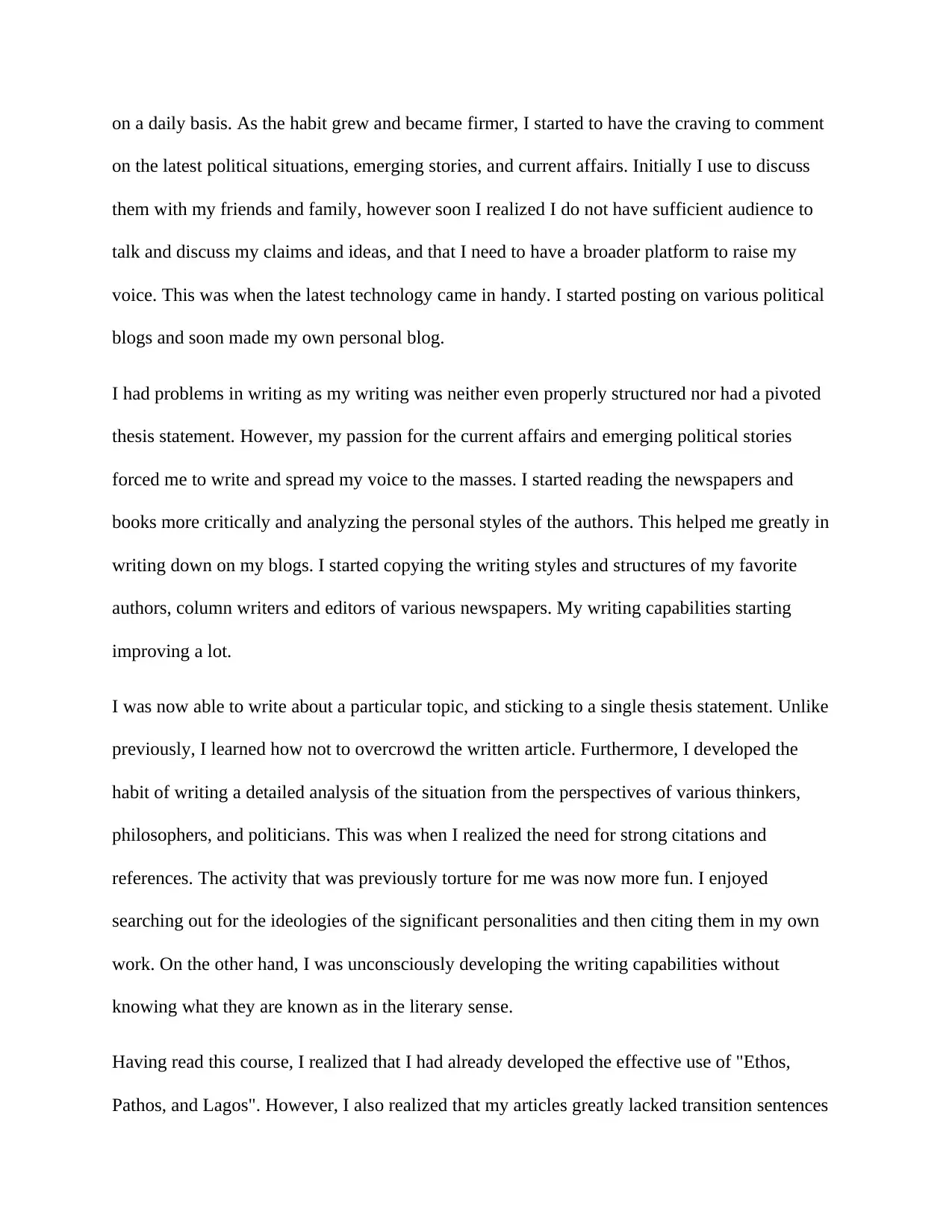
on a daily basis. As the habit grew and became firmer, I started to have the craving to comment
on the latest political situations, emerging stories, and current affairs. Initially I use to discuss
them with my friends and family, however soon I realized I do not have sufficient audience to
talk and discuss my claims and ideas, and that I need to have a broader platform to raise my
voice. This was when the latest technology came in handy. I started posting on various political
blogs and soon made my own personal blog.
I had problems in writing as my writing was neither even properly structured nor had a pivoted
thesis statement. However, my passion for the current affairs and emerging political stories
forced me to write and spread my voice to the masses. I started reading the newspapers and
books more critically and analyzing the personal styles of the authors. This helped me greatly in
writing down on my blogs. I started copying the writing styles and structures of my favorite
authors, column writers and editors of various newspapers. My writing capabilities starting
improving a lot.
I was now able to write about a particular topic, and sticking to a single thesis statement. Unlike
previously, I learned how not to overcrowd the written article. Furthermore, I developed the
habit of writing a detailed analysis of the situation from the perspectives of various thinkers,
philosophers, and politicians. This was when I realized the need for strong citations and
references. The activity that was previously torture for me was now more fun. I enjoyed
searching out for the ideologies of the significant personalities and then citing them in my own
work. On the other hand, I was unconsciously developing the writing capabilities without
knowing what they are known as in the literary sense.
Having read this course, I realized that I had already developed the effective use of "Ethos,
Pathos, and Lagos". However, I also realized that my articles greatly lacked transition sentences
on the latest political situations, emerging stories, and current affairs. Initially I use to discuss
them with my friends and family, however soon I realized I do not have sufficient audience to
talk and discuss my claims and ideas, and that I need to have a broader platform to raise my
voice. This was when the latest technology came in handy. I started posting on various political
blogs and soon made my own personal blog.
I had problems in writing as my writing was neither even properly structured nor had a pivoted
thesis statement. However, my passion for the current affairs and emerging political stories
forced me to write and spread my voice to the masses. I started reading the newspapers and
books more critically and analyzing the personal styles of the authors. This helped me greatly in
writing down on my blogs. I started copying the writing styles and structures of my favorite
authors, column writers and editors of various newspapers. My writing capabilities starting
improving a lot.
I was now able to write about a particular topic, and sticking to a single thesis statement. Unlike
previously, I learned how not to overcrowd the written article. Furthermore, I developed the
habit of writing a detailed analysis of the situation from the perspectives of various thinkers,
philosophers, and politicians. This was when I realized the need for strong citations and
references. The activity that was previously torture for me was now more fun. I enjoyed
searching out for the ideologies of the significant personalities and then citing them in my own
work. On the other hand, I was unconsciously developing the writing capabilities without
knowing what they are known as in the literary sense.
Having read this course, I realized that I had already developed the effective use of "Ethos,
Pathos, and Lagos". However, I also realized that my articles greatly lacked transition sentences
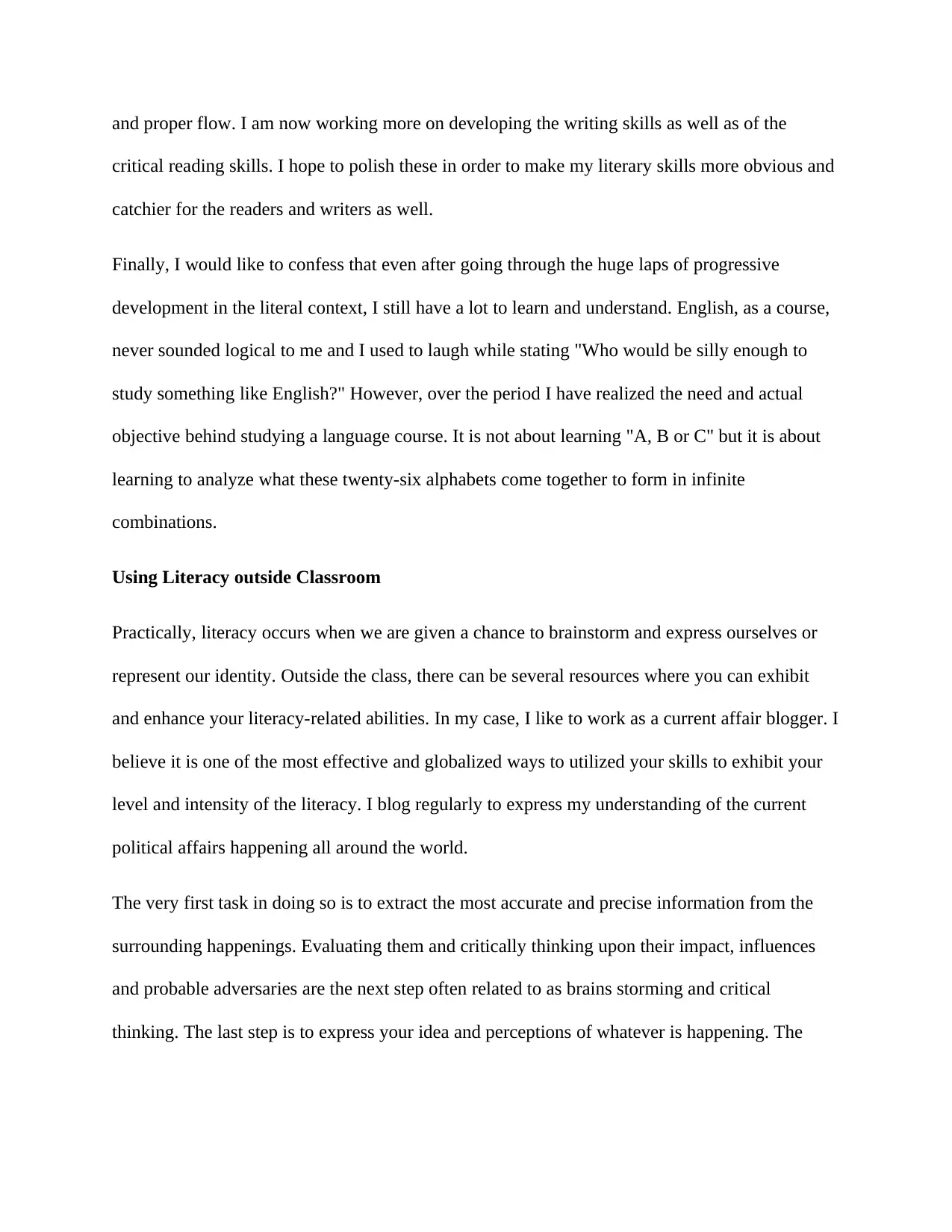
and proper flow. I am now working more on developing the writing skills as well as of the
critical reading skills. I hope to polish these in order to make my literary skills more obvious and
catchier for the readers and writers as well.
Finally, I would like to confess that even after going through the huge laps of progressive
development in the literal context, I still have a lot to learn and understand. English, as a course,
never sounded logical to me and I used to laugh while stating "Who would be silly enough to
study something like English?" However, over the period I have realized the need and actual
objective behind studying a language course. It is not about learning "A, B or C" but it is about
learning to analyze what these twenty-six alphabets come together to form in infinite
combinations.
Using Literacy outside Classroom
Practically, literacy occurs when we are given a chance to brainstorm and express ourselves or
represent our identity. Outside the class, there can be several resources where you can exhibit
and enhance your literacy-related abilities. In my case, I like to work as a current affair blogger. I
believe it is one of the most effective and globalized ways to utilized your skills to exhibit your
level and intensity of the literacy. I blog regularly to express my understanding of the current
political affairs happening all around the world.
The very first task in doing so is to extract the most accurate and precise information from the
surrounding happenings. Evaluating them and critically thinking upon their impact, influences
and probable adversaries are the next step often related to as brains storming and critical
thinking. The last step is to express your idea and perceptions of whatever is happening. The
critical reading skills. I hope to polish these in order to make my literary skills more obvious and
catchier for the readers and writers as well.
Finally, I would like to confess that even after going through the huge laps of progressive
development in the literal context, I still have a lot to learn and understand. English, as a course,
never sounded logical to me and I used to laugh while stating "Who would be silly enough to
study something like English?" However, over the period I have realized the need and actual
objective behind studying a language course. It is not about learning "A, B or C" but it is about
learning to analyze what these twenty-six alphabets come together to form in infinite
combinations.
Using Literacy outside Classroom
Practically, literacy occurs when we are given a chance to brainstorm and express ourselves or
represent our identity. Outside the class, there can be several resources where you can exhibit
and enhance your literacy-related abilities. In my case, I like to work as a current affair blogger. I
believe it is one of the most effective and globalized ways to utilized your skills to exhibit your
level and intensity of the literacy. I blog regularly to express my understanding of the current
political affairs happening all around the world.
The very first task in doing so is to extract the most accurate and precise information from the
surrounding happenings. Evaluating them and critically thinking upon their impact, influences
and probable adversaries are the next step often related to as brains storming and critical
thinking. The last step is to express your idea and perceptions of whatever is happening. The
⊘ This is a preview!⊘
Do you want full access?
Subscribe today to unlock all pages.

Trusted by 1+ million students worldwide
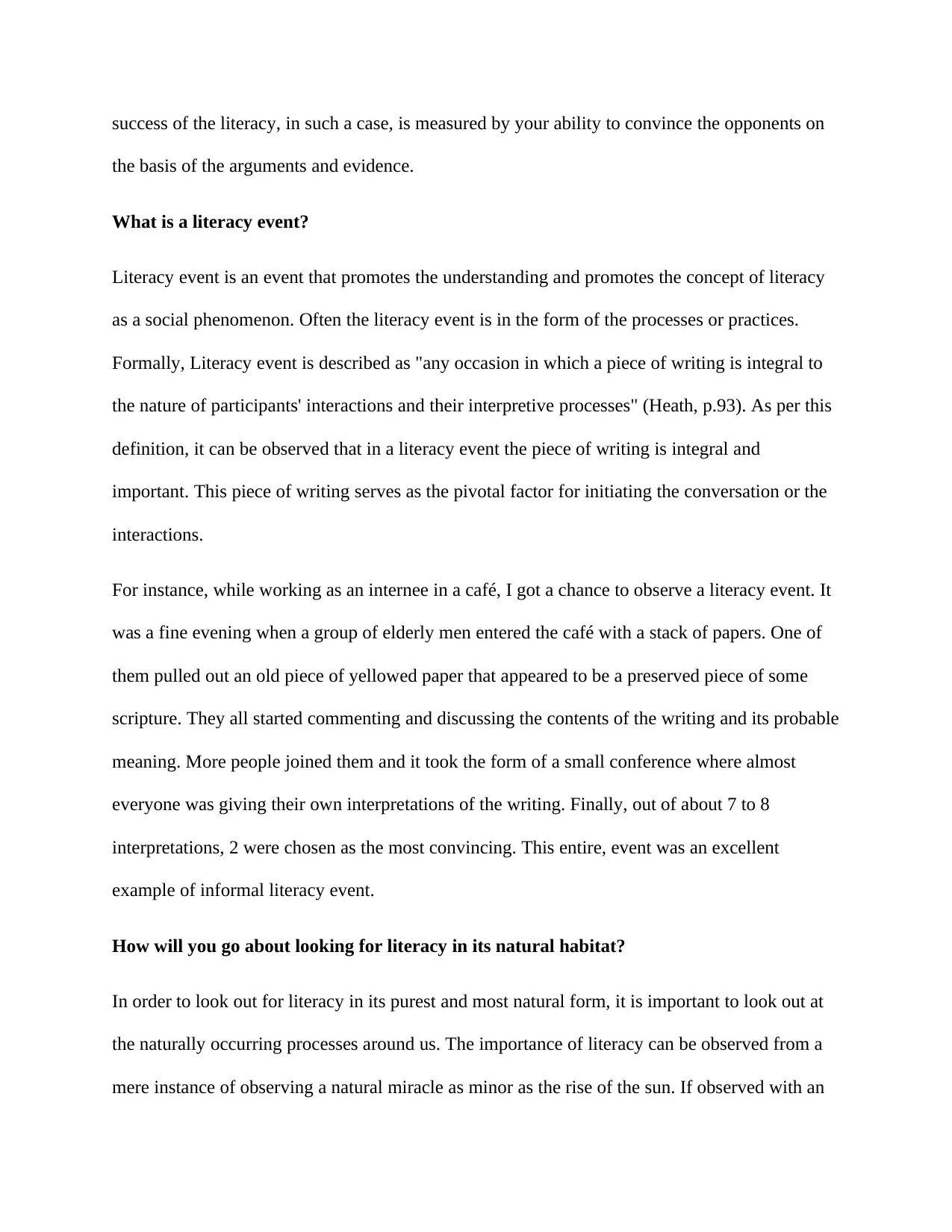
success of the literacy, in such a case, is measured by your ability to convince the opponents on
the basis of the arguments and evidence.
What is a literacy event?
Literacy event is an event that promotes the understanding and promotes the concept of literacy
as a social phenomenon. Often the literacy event is in the form of the processes or practices.
Formally, Literacy event is described as "any occasion in which a piece of writing is integral to
the nature of participants' interactions and their interpretive processes" (Heath, p.93). As per this
definition, it can be observed that in a literacy event the piece of writing is integral and
important. This piece of writing serves as the pivotal factor for initiating the conversation or the
interactions.
For instance, while working as an internee in a café, I got a chance to observe a literacy event. It
was a fine evening when a group of elderly men entered the café with a stack of papers. One of
them pulled out an old piece of yellowed paper that appeared to be a preserved piece of some
scripture. They all started commenting and discussing the contents of the writing and its probable
meaning. More people joined them and it took the form of a small conference where almost
everyone was giving their own interpretations of the writing. Finally, out of about 7 to 8
interpretations, 2 were chosen as the most convincing. This entire, event was an excellent
example of informal literacy event.
How will you go about looking for literacy in its natural habitat?
In order to look out for literacy in its purest and most natural form, it is important to look out at
the naturally occurring processes around us. The importance of literacy can be observed from a
mere instance of observing a natural miracle as minor as the rise of the sun. If observed with an
the basis of the arguments and evidence.
What is a literacy event?
Literacy event is an event that promotes the understanding and promotes the concept of literacy
as a social phenomenon. Often the literacy event is in the form of the processes or practices.
Formally, Literacy event is described as "any occasion in which a piece of writing is integral to
the nature of participants' interactions and their interpretive processes" (Heath, p.93). As per this
definition, it can be observed that in a literacy event the piece of writing is integral and
important. This piece of writing serves as the pivotal factor for initiating the conversation or the
interactions.
For instance, while working as an internee in a café, I got a chance to observe a literacy event. It
was a fine evening when a group of elderly men entered the café with a stack of papers. One of
them pulled out an old piece of yellowed paper that appeared to be a preserved piece of some
scripture. They all started commenting and discussing the contents of the writing and its probable
meaning. More people joined them and it took the form of a small conference where almost
everyone was giving their own interpretations of the writing. Finally, out of about 7 to 8
interpretations, 2 were chosen as the most convincing. This entire, event was an excellent
example of informal literacy event.
How will you go about looking for literacy in its natural habitat?
In order to look out for literacy in its purest and most natural form, it is important to look out at
the naturally occurring processes around us. The importance of literacy can be observed from a
mere instance of observing a natural miracle as minor as the rise of the sun. If observed with an
Paraphrase This Document
Need a fresh take? Get an instant paraphrase of this document with our AI Paraphraser
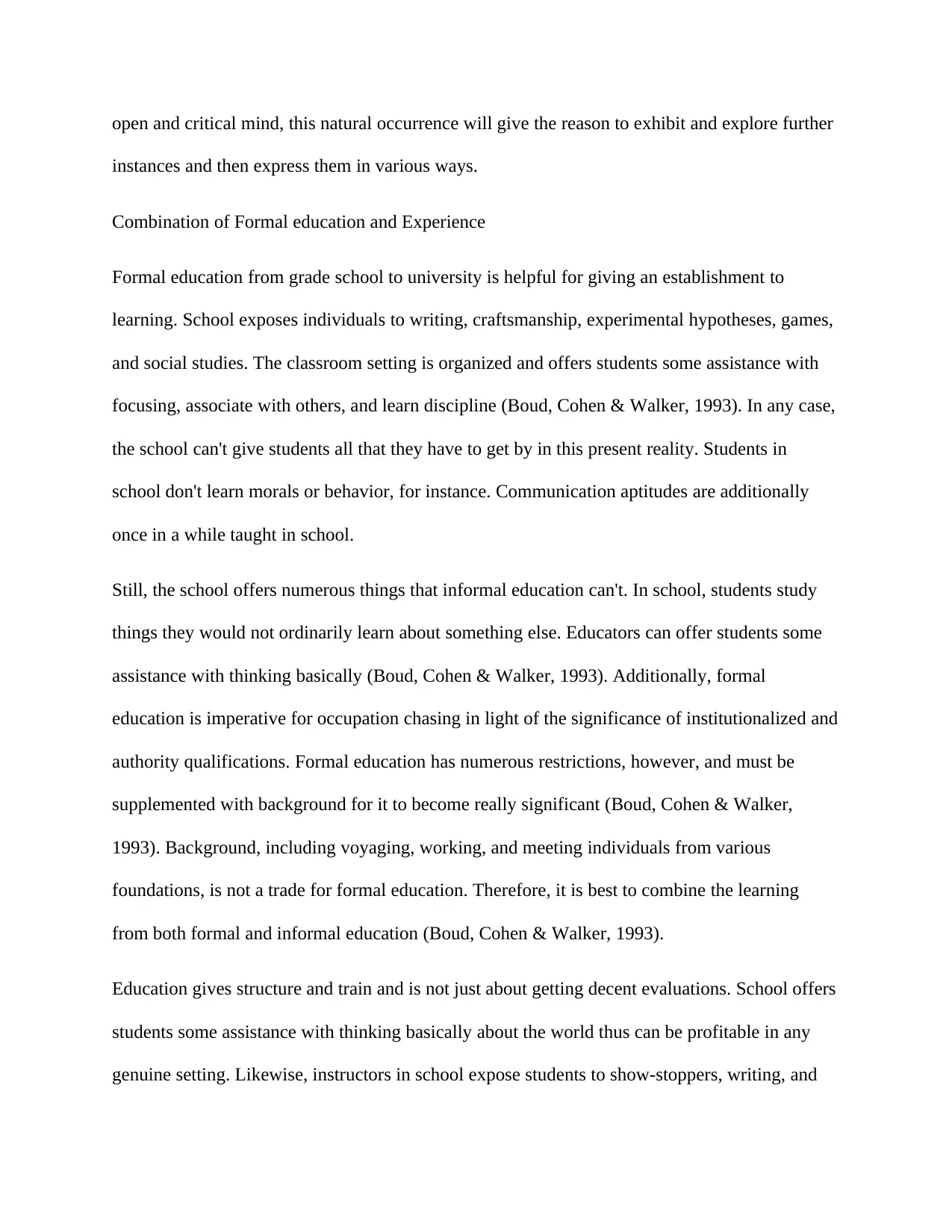
open and critical mind, this natural occurrence will give the reason to exhibit and explore further
instances and then express them in various ways.
Combination of Formal education and Experience
Formal education from grade school to university is helpful for giving an establishment to
learning. School exposes individuals to writing, craftsmanship, experimental hypotheses, games,
and social studies. The classroom setting is organized and offers students some assistance with
focusing, associate with others, and learn discipline (Boud, Cohen & Walker, 1993). In any case,
the school can't give students all that they have to get by in this present reality. Students in
school don't learn morals or behavior, for instance. Communication aptitudes are additionally
once in a while taught in school.
Still, the school offers numerous things that informal education can't. In school, students study
things they would not ordinarily learn about something else. Educators can offer students some
assistance with thinking basically (Boud, Cohen & Walker, 1993). Additionally, formal
education is imperative for occupation chasing in light of the significance of institutionalized and
authority qualifications. Formal education has numerous restrictions, however, and must be
supplemented with background for it to become really significant (Boud, Cohen & Walker,
1993). Background, including voyaging, working, and meeting individuals from various
foundations, is not a trade for formal education. Therefore, it is best to combine the learning
from both formal and informal education (Boud, Cohen & Walker, 1993).
Education gives structure and train and is not just about getting decent evaluations. School offers
students some assistance with thinking basically about the world thus can be profitable in any
genuine setting. Likewise, instructors in school expose students to show-stoppers, writing, and
instances and then express them in various ways.
Combination of Formal education and Experience
Formal education from grade school to university is helpful for giving an establishment to
learning. School exposes individuals to writing, craftsmanship, experimental hypotheses, games,
and social studies. The classroom setting is organized and offers students some assistance with
focusing, associate with others, and learn discipline (Boud, Cohen & Walker, 1993). In any case,
the school can't give students all that they have to get by in this present reality. Students in
school don't learn morals or behavior, for instance. Communication aptitudes are additionally
once in a while taught in school.
Still, the school offers numerous things that informal education can't. In school, students study
things they would not ordinarily learn about something else. Educators can offer students some
assistance with thinking basically (Boud, Cohen & Walker, 1993). Additionally, formal
education is imperative for occupation chasing in light of the significance of institutionalized and
authority qualifications. Formal education has numerous restrictions, however, and must be
supplemented with background for it to become really significant (Boud, Cohen & Walker,
1993). Background, including voyaging, working, and meeting individuals from various
foundations, is not a trade for formal education. Therefore, it is best to combine the learning
from both formal and informal education (Boud, Cohen & Walker, 1993).
Education gives structure and train and is not just about getting decent evaluations. School offers
students some assistance with thinking basically about the world thus can be profitable in any
genuine setting. Likewise, instructors in school expose students to show-stoppers, writing, and
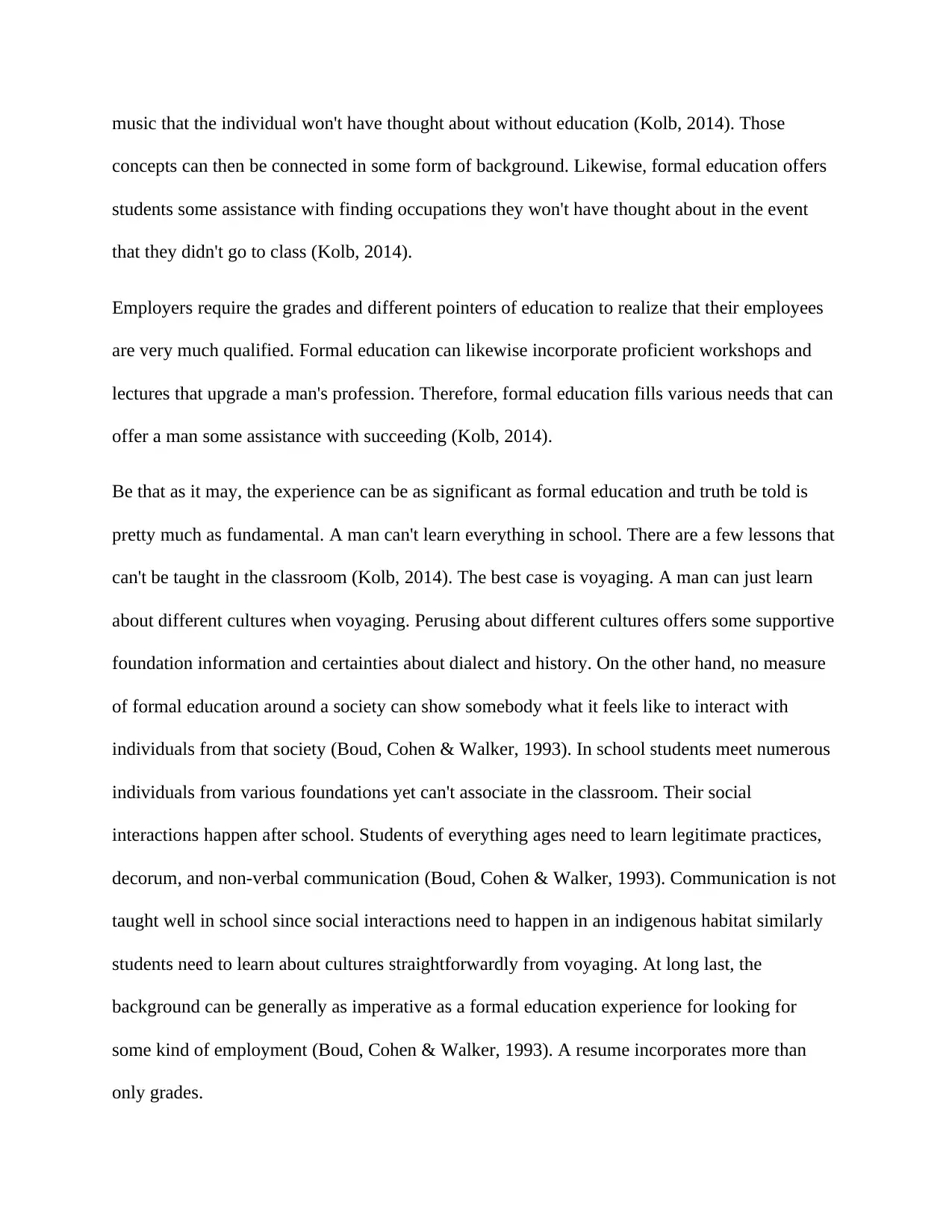
music that the individual won't have thought about without education (Kolb, 2014). Those
concepts can then be connected in some form of background. Likewise, formal education offers
students some assistance with finding occupations they won't have thought about in the event
that they didn't go to class (Kolb, 2014).
Employers require the grades and different pointers of education to realize that their employees
are very much qualified. Formal education can likewise incorporate proficient workshops and
lectures that upgrade a man's profession. Therefore, formal education fills various needs that can
offer a man some assistance with succeeding (Kolb, 2014).
Be that as it may, the experience can be as significant as formal education and truth be told is
pretty much as fundamental. A man can't learn everything in school. There are a few lessons that
can't be taught in the classroom (Kolb, 2014). The best case is voyaging. A man can just learn
about different cultures when voyaging. Perusing about different cultures offers some supportive
foundation information and certainties about dialect and history. On the other hand, no measure
of formal education around a society can show somebody what it feels like to interact with
individuals from that society (Boud, Cohen & Walker, 1993). In school students meet numerous
individuals from various foundations yet can't associate in the classroom. Their social
interactions happen after school. Students of everything ages need to learn legitimate practices,
decorum, and non-verbal communication (Boud, Cohen & Walker, 1993). Communication is not
taught well in school since social interactions need to happen in an indigenous habitat similarly
students need to learn about cultures straightforwardly from voyaging. At long last, the
background can be generally as imperative as a formal education experience for looking for
some kind of employment (Boud, Cohen & Walker, 1993). A resume incorporates more than
only grades.
concepts can then be connected in some form of background. Likewise, formal education offers
students some assistance with finding occupations they won't have thought about in the event
that they didn't go to class (Kolb, 2014).
Employers require the grades and different pointers of education to realize that their employees
are very much qualified. Formal education can likewise incorporate proficient workshops and
lectures that upgrade a man's profession. Therefore, formal education fills various needs that can
offer a man some assistance with succeeding (Kolb, 2014).
Be that as it may, the experience can be as significant as formal education and truth be told is
pretty much as fundamental. A man can't learn everything in school. There are a few lessons that
can't be taught in the classroom (Kolb, 2014). The best case is voyaging. A man can just learn
about different cultures when voyaging. Perusing about different cultures offers some supportive
foundation information and certainties about dialect and history. On the other hand, no measure
of formal education around a society can show somebody what it feels like to interact with
individuals from that society (Boud, Cohen & Walker, 1993). In school students meet numerous
individuals from various foundations yet can't associate in the classroom. Their social
interactions happen after school. Students of everything ages need to learn legitimate practices,
decorum, and non-verbal communication (Boud, Cohen & Walker, 1993). Communication is not
taught well in school since social interactions need to happen in an indigenous habitat similarly
students need to learn about cultures straightforwardly from voyaging. At long last, the
background can be generally as imperative as a formal education experience for looking for
some kind of employment (Boud, Cohen & Walker, 1993). A resume incorporates more than
only grades.
⊘ This is a preview!⊘
Do you want full access?
Subscribe today to unlock all pages.

Trusted by 1+ million students worldwide
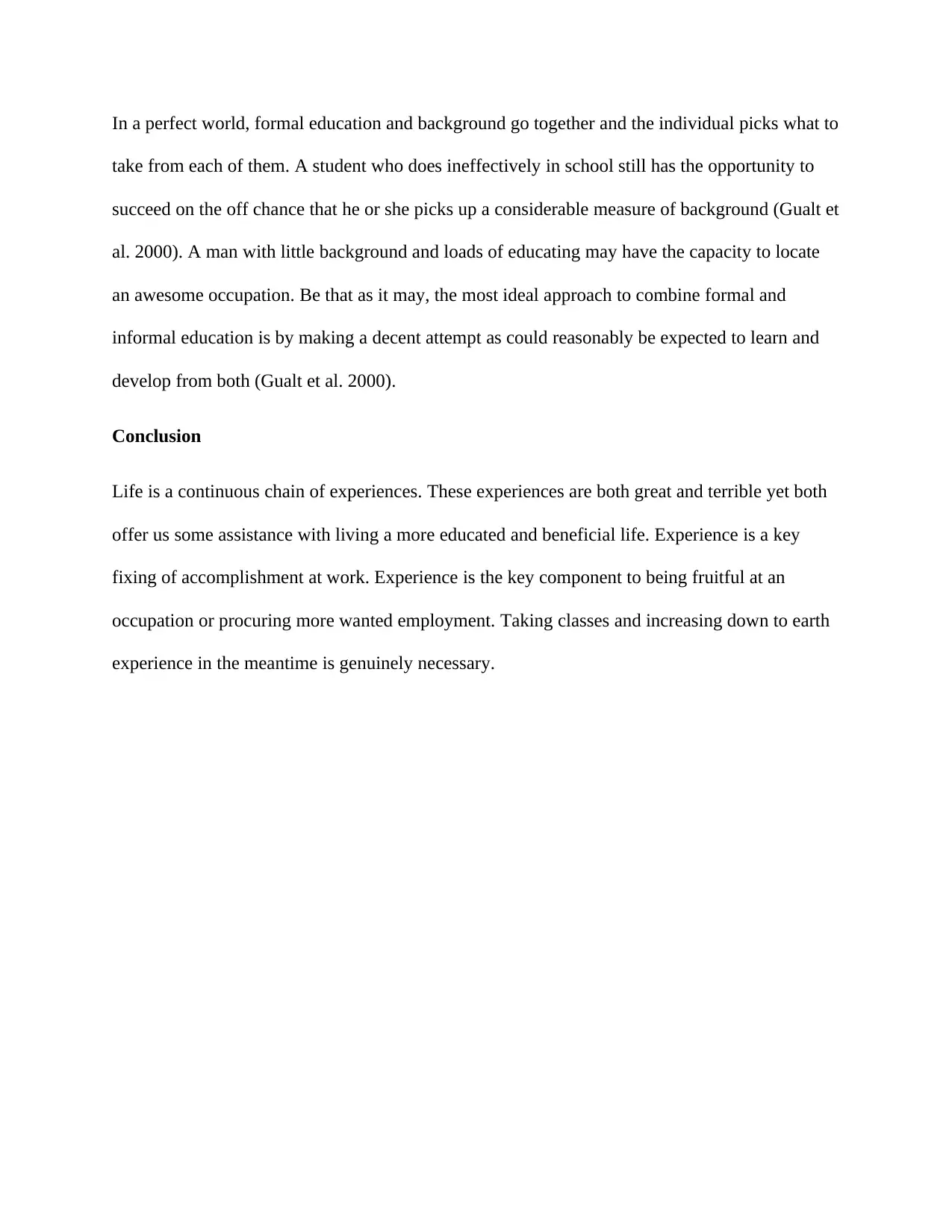
In a perfect world, formal education and background go together and the individual picks what to
take from each of them. A student who does ineffectively in school still has the opportunity to
succeed on the off chance that he or she picks up a considerable measure of background (Gualt et
al. 2000). A man with little background and loads of educating may have the capacity to locate
an awesome occupation. Be that as it may, the most ideal approach to combine formal and
informal education is by making a decent attempt as could reasonably be expected to learn and
develop from both (Gualt et al. 2000).
Conclusion
Life is a continuous chain of experiences. These experiences are both great and terrible yet both
offer us some assistance with living a more educated and beneficial life. Experience is a key
fixing of accomplishment at work. Experience is the key component to being fruitful at an
occupation or procuring more wanted employment. Taking classes and increasing down to earth
experience in the meantime is genuinely necessary.
take from each of them. A student who does ineffectively in school still has the opportunity to
succeed on the off chance that he or she picks up a considerable measure of background (Gualt et
al. 2000). A man with little background and loads of educating may have the capacity to locate
an awesome occupation. Be that as it may, the most ideal approach to combine formal and
informal education is by making a decent attempt as could reasonably be expected to learn and
develop from both (Gualt et al. 2000).
Conclusion
Life is a continuous chain of experiences. These experiences are both great and terrible yet both
offer us some assistance with living a more educated and beneficial life. Experience is a key
fixing of accomplishment at work. Experience is the key component to being fruitful at an
occupation or procuring more wanted employment. Taking classes and increasing down to earth
experience in the meantime is genuinely necessary.
Paraphrase This Document
Need a fresh take? Get an instant paraphrase of this document with our AI Paraphraser
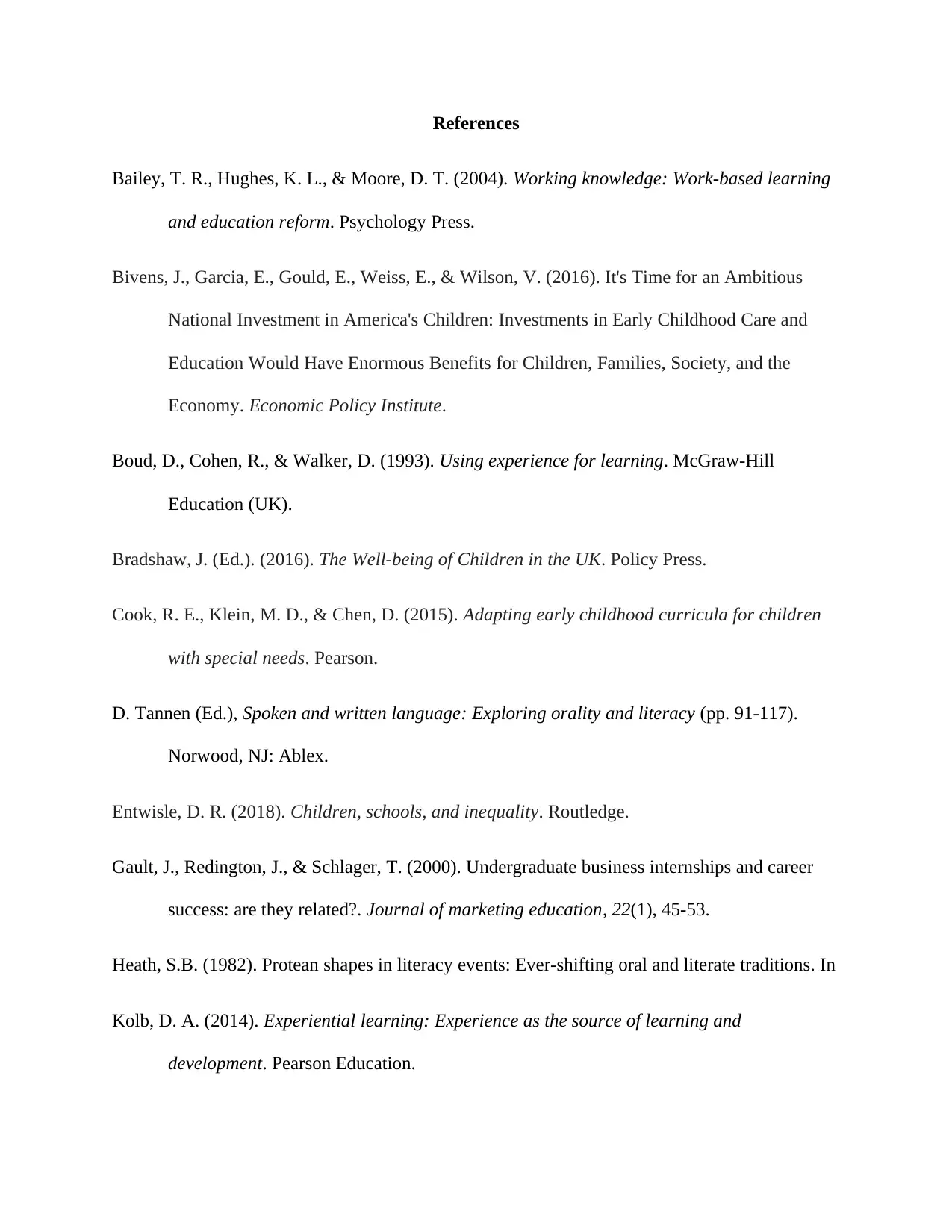
References
Bailey, T. R., Hughes, K. L., & Moore, D. T. (2004). Working knowledge: Work-based learning
and education reform. Psychology Press.
Bivens, J., Garcia, E., Gould, E., Weiss, E., & Wilson, V. (2016). It's Time for an Ambitious
National Investment in America's Children: Investments in Early Childhood Care and
Education Would Have Enormous Benefits for Children, Families, Society, and the
Economy. Economic Policy Institute.
Boud, D., Cohen, R., & Walker, D. (1993). Using experience for learning. McGraw-Hill
Education (UK).
Bradshaw, J. (Ed.). (2016). The Well-being of Children in the UK. Policy Press.
Cook, R. E., Klein, M. D., & Chen, D. (2015). Adapting early childhood curricula for children
with special needs. Pearson.
D. Tannen (Ed.), Spoken and written language: Exploring orality and literacy (pp. 91-117).
Norwood, NJ: Ablex.
Entwisle, D. R. (2018). Children, schools, and inequality. Routledge.
Gault, J., Redington, J., & Schlager, T. (2000). Undergraduate business internships and career
success: are they related?. Journal of marketing education, 22(1), 45-53.
Heath, S.B. (1982). Protean shapes in literacy events: Ever-shifting oral and literate traditions. In
Kolb, D. A. (2014). Experiential learning: Experience as the source of learning and
development. Pearson Education.
Bailey, T. R., Hughes, K. L., & Moore, D. T. (2004). Working knowledge: Work-based learning
and education reform. Psychology Press.
Bivens, J., Garcia, E., Gould, E., Weiss, E., & Wilson, V. (2016). It's Time for an Ambitious
National Investment in America's Children: Investments in Early Childhood Care and
Education Would Have Enormous Benefits for Children, Families, Society, and the
Economy. Economic Policy Institute.
Boud, D., Cohen, R., & Walker, D. (1993). Using experience for learning. McGraw-Hill
Education (UK).
Bradshaw, J. (Ed.). (2016). The Well-being of Children in the UK. Policy Press.
Cook, R. E., Klein, M. D., & Chen, D. (2015). Adapting early childhood curricula for children
with special needs. Pearson.
D. Tannen (Ed.), Spoken and written language: Exploring orality and literacy (pp. 91-117).
Norwood, NJ: Ablex.
Entwisle, D. R. (2018). Children, schools, and inequality. Routledge.
Gault, J., Redington, J., & Schlager, T. (2000). Undergraduate business internships and career
success: are they related?. Journal of marketing education, 22(1), 45-53.
Heath, S.B. (1982). Protean shapes in literacy events: Ever-shifting oral and literate traditions. In
Kolb, D. A. (2014). Experiential learning: Experience as the source of learning and
development. Pearson Education.
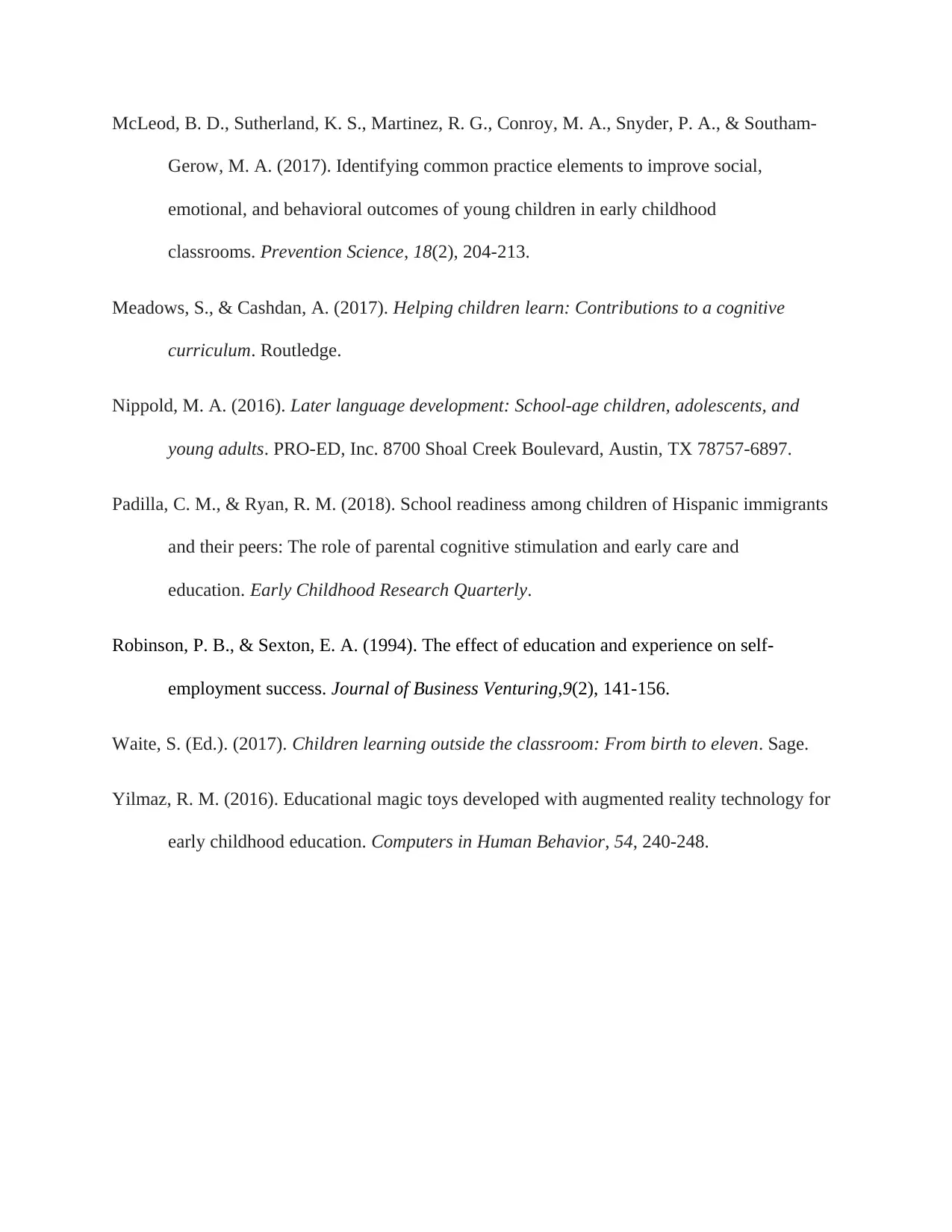
McLeod, B. D., Sutherland, K. S., Martinez, R. G., Conroy, M. A., Snyder, P. A., & Southam-
Gerow, M. A. (2017). Identifying common practice elements to improve social,
emotional, and behavioral outcomes of young children in early childhood
classrooms. Prevention Science, 18(2), 204-213.
Meadows, S., & Cashdan, A. (2017). Helping children learn: Contributions to a cognitive
curriculum. Routledge.
Nippold, M. A. (2016). Later language development: School-age children, adolescents, and
young adults. PRO-ED, Inc. 8700 Shoal Creek Boulevard, Austin, TX 78757-6897.
Padilla, C. M., & Ryan, R. M. (2018). School readiness among children of Hispanic immigrants
and their peers: The role of parental cognitive stimulation and early care and
education. Early Childhood Research Quarterly.
Robinson, P. B., & Sexton, E. A. (1994). The effect of education and experience on self-
employment success. Journal of Business Venturing,9(2), 141-156.
Waite, S. (Ed.). (2017). Children learning outside the classroom: From birth to eleven. Sage.
Yilmaz, R. M. (2016). Educational magic toys developed with augmented reality technology for
early childhood education. Computers in Human Behavior, 54, 240-248.
Gerow, M. A. (2017). Identifying common practice elements to improve social,
emotional, and behavioral outcomes of young children in early childhood
classrooms. Prevention Science, 18(2), 204-213.
Meadows, S., & Cashdan, A. (2017). Helping children learn: Contributions to a cognitive
curriculum. Routledge.
Nippold, M. A. (2016). Later language development: School-age children, adolescents, and
young adults. PRO-ED, Inc. 8700 Shoal Creek Boulevard, Austin, TX 78757-6897.
Padilla, C. M., & Ryan, R. M. (2018). School readiness among children of Hispanic immigrants
and their peers: The role of parental cognitive stimulation and early care and
education. Early Childhood Research Quarterly.
Robinson, P. B., & Sexton, E. A. (1994). The effect of education and experience on self-
employment success. Journal of Business Venturing,9(2), 141-156.
Waite, S. (Ed.). (2017). Children learning outside the classroom: From birth to eleven. Sage.
Yilmaz, R. M. (2016). Educational magic toys developed with augmented reality technology for
early childhood education. Computers in Human Behavior, 54, 240-248.
⊘ This is a preview!⊘
Do you want full access?
Subscribe today to unlock all pages.

Trusted by 1+ million students worldwide
1 out of 9
Related Documents
Your All-in-One AI-Powered Toolkit for Academic Success.
+13062052269
info@desklib.com
Available 24*7 on WhatsApp / Email
![[object Object]](/_next/static/media/star-bottom.7253800d.svg)
Unlock your academic potential
Copyright © 2020–2026 A2Z Services. All Rights Reserved. Developed and managed by ZUCOL.





